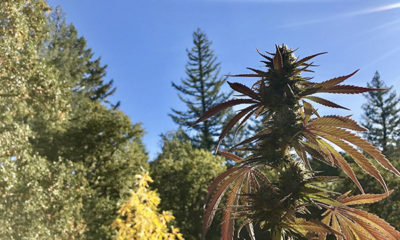
Joint Opinions
The DEA Should Deschedule Cannabis, Not Move it to Schedule II
The debate around the medical value of cannabis often perpetuates a few crucial lies: that our drug scheduling system makes sense, that THC cannot be medicinal and that there’s scientific support behind CBD-only laws. We need to correct these lies and deschedule the entire cannabis plant.
It is hard to admit when you are wrong, say you are sorry and take corrective action. Our government seemingly never will. In the case of cannabis prohibition, the lies that started it continue to live on as the wave of cannabis legalization builds across the nation, and these lies are so big, dangerous and profitable they have become accepted as inevitable. In the past ten years, the United States has seen two presidents with two drastically different agendas, and both have appeared uninterested in righting the wrongs of cannabis prohibition. I think it is time we stop hoping someone in power will tell the truth — and instead demand it ourselves.
A good example of how reluctant powerful politicians are about acknowledging the true safety of cannabis is James Cole, the former deputy attorney general of the United States under President Obama and the author of the now-rescinded Cole Memo. During a public question and answer session at the National Cannabis Industry Association summit in San Jose, California in July, Cole repeatedly dodged questions about if the DEA should deschedule cannabis, before admitting that he only supported a move to Schedule II.
However, to truly even start to right all the wrongs of the drug war, not just make the rich richer, we must acknowledge all the lies of cannabis prohibition and move beyond the current drug scheduling system. Moving cannabis to Schedule II is not enough.
This is especially pertinent now, as the DEA will soon be forced to reschedule CBD. On June 25, the FDA granted approval to Epidiolex, an epilepsy drug with CBD from cannabis as its active ingredient. This ruling established that CBD from cannabis has medical benefits, thereby requiring the DEA to move CBD or cannabis out of Schedule I, which they said they will do within 90 days of the FDA’s ruling.
The Original Sin: Cannabis Prohibition
For most of American history, there was no such thing as “drug schedules.” The current drug schedules came into effect after the 1961 United Nations Single Convention on Narcotic Drugs, which was heavily influenced by the known racist liar who spearheaded cannabis prohibition, Harry J. Anslinger.
Anslinger is also notable for being the catalyst and first commissioner of the Federal Bureau of Narcotics, the precursor to the Drug Enforcement Administration. He was the OG liar and mastermind of cannabis prohibition.
The Schedule I Lie
In accordance with the 1961 United Nations treaty, then-president Richard Nixon signed the Controlled Substances Act in 1970, which created America’s drug scheduling system.
While “vice drugs” like alcohol or tobacco were not even listed and most other herbal products tend to be listed as “GRAS,” or “generally recognized as safe,” the cannabis plant was granted the Schedule I designation.
So, not only was the entire system of scheduling drugs based upon faulty premises to begin with, the cannabis plant was listed as having no accepted medical value, which the vast majority of Americans now know to be an aggressive and sadistic lie.
Scheduling THC: The High Lies
Today, many politicians assert that cannabis can have no medicinal benefits and should remain Schedule I, despite the fact that a synthetic THC medication and a cannabis-derived CBD medication are now FDA-approved drugs.
“You can have medicinal marijuana, that is truly medicinal, that is not psychoactive under the DEA regime,” Cole told the NCIA summit. “You can have the intoxicant aspect of it regulated like we’re regulating alcohol.”
This is a particularly egregious lie. In no way would any qualified science or medical professional make a statement that intoxicating substances aren’t medicinal because they are intoxicating, yet the lie is pervasive when it comes to the profitable over-regulation of cannabis.
Also, keep in mind that THC — the active ingredient in cannabis responsible for that “high” in pure synthetic form — is currently in a Schedule III drug (Marinol) that has been prescribed to children and adults for over 30 years. Marinol is FDA-approved, is legal to take at work or in rental dwellings, is prescribed to both children and adults and is even considered safe to drive on after a user develops a tolerance.
The Medical Lie Machine
The entire cannabis plant, including industrial hemp varieties, is only illegal because law enforcement can’t easily tell the difference between the high-THC varieties so many of us enjoy growing and consuming in flower form. But there is no technical line of THC that delineates hemp from marijuana. The current legal line that draws a distinction between hemp and marijuana under the 2014 Farm Bill is 0.3 percent THC, but the two Canadian scientists who identified that 0.3 percent THC line knew it was arbitrary and never intended for it to set a legal precedent.
Today, the whole CBD-only legislative movement and hemp-derived CBD industry are just perpetuations of the legal lie that hemp is substantively different from marijuana.
If we acknowledge these legal arguments as predicated on lies about cannabis, the only logical conclusion is a full federal decriminalization and descheduling of the entire cannabis plant. This would include a release of prisoners whose crimes are solely the use, possession and trafficking of cannabis and the ability of states and localities to regulate their own commercial markets. This would also open the floodgates to actual useful trials and studies by taking away the government’s nonsensical research monopoly.
Redefining Medical Marijuana
Cannabis does not kill. It actually has helped a growing and diverse body of suffering people heal and has the potential to save a lot of lives. A free and fair commercial market alongside home cultivation rights would spell the end to a criminal market and the need to enforce — which is why Cole’s answer in favor of Schedule II is beyond disappointing. Instead, his response is angering, because he is basically advocating for a new version of prohibition for small producers, while the major corporations that profited from prohibition line up to carve up the legal industry into an oligopoly.
The FDA approval of cannabis-derived CBD, GW Pharmaceuticals’ Epidiolex, has spurred the DEA to reschedule CBD. It is likely that the DEA will rule cannabis-derived CBD should be considered somewhere between Schedules II and IV, based on the prior approvals of a handful of other drugs that mimic isolated cannabis compounds.
Because of the high cost of FDA approval, Epidiolex is going to be far more expensive than the plant medicine already available in legal markets, but it will be covered by insurance for some diagnoses. The annual cost of Epidiolex will be $32,500, or about $2,700 a month.
Dale Gieringer, Ph.D., of California NORML estimates that this price is over double the cost of the equivalent amount of whole-plant sourced CBD currently found on medical markets. It is also even cheaper for a patient to grow what they need themselves with the right and willingness to do it.
With insurance coverage of biopharmaceutical marijuana and the death of West Coast compassionate caregivers, which provided patients with their botanical needs free of charge before legalization, the future could mean that similar biopharmaceutical FDA-approved drugs will be the only legal and affordable option for patients in all states.
And, conveniently, if the government labels a cannabis consumer as “recreational,” they are subject to very high taxes and industry-wide regulations that artificially inflate the price and maintain a criminal element to enforce upon. Cole and other so-called “moderate reformers” are constantly underlining the need for “rigorous regulations,” but of course when it comes to legalization and medical access the devil is in the details, and often those details are the way small businesses get shut out and patient medicine gets redefined. This model is great for crony capitalists who don’t want to compete in a fair and free market, but it’s terrible for small community-based businesses and all botanical cannabis consumers.
The perpetuation of these lies is an ongoing crisis not just for potheads, patients or whatever else we choose to label people who interact with this plant — it’s a crisis for the plant itself. The truth matters and it is time to demand legislation that reflects it.
TELL US, what other cannabis lies do you think prohibition has perpetuated?























